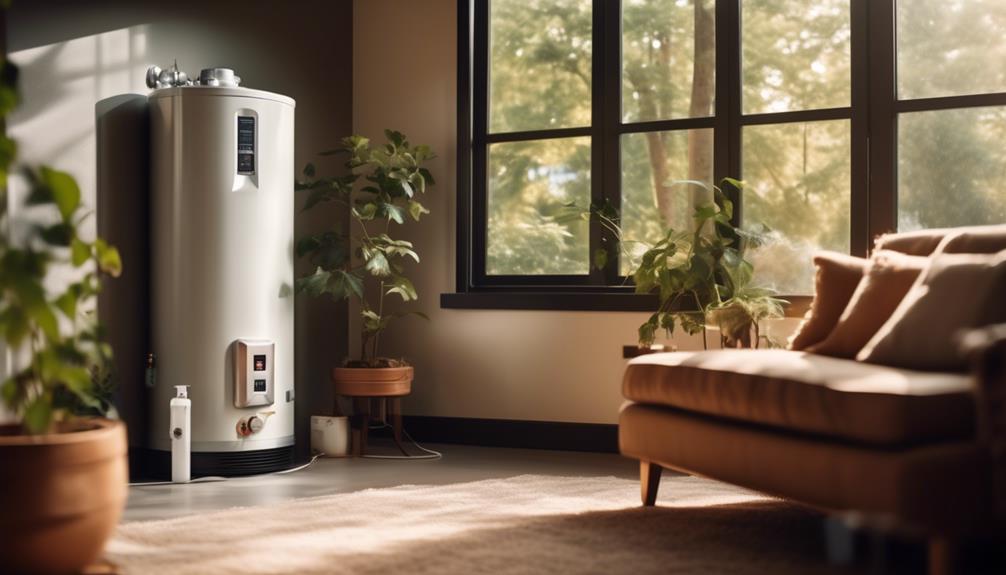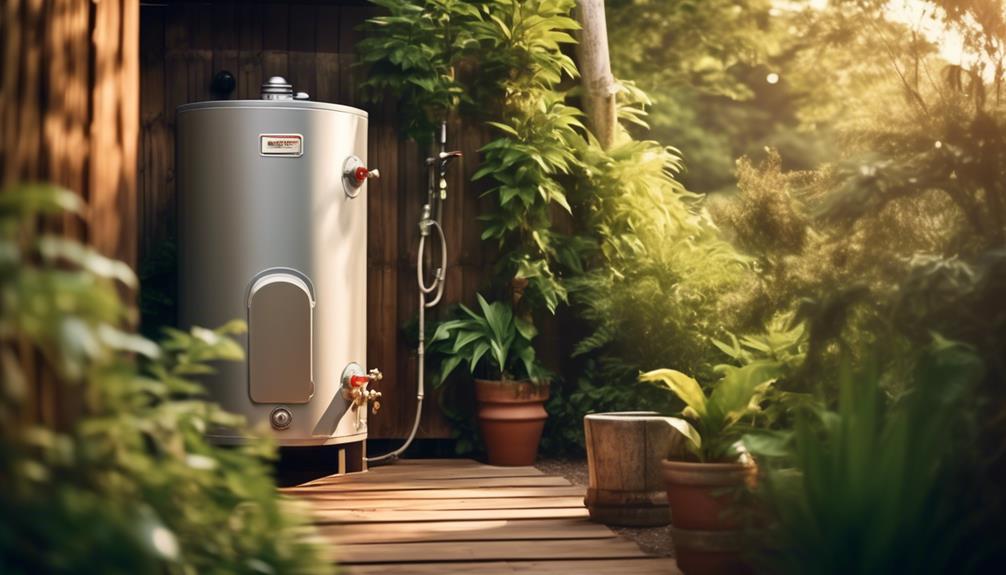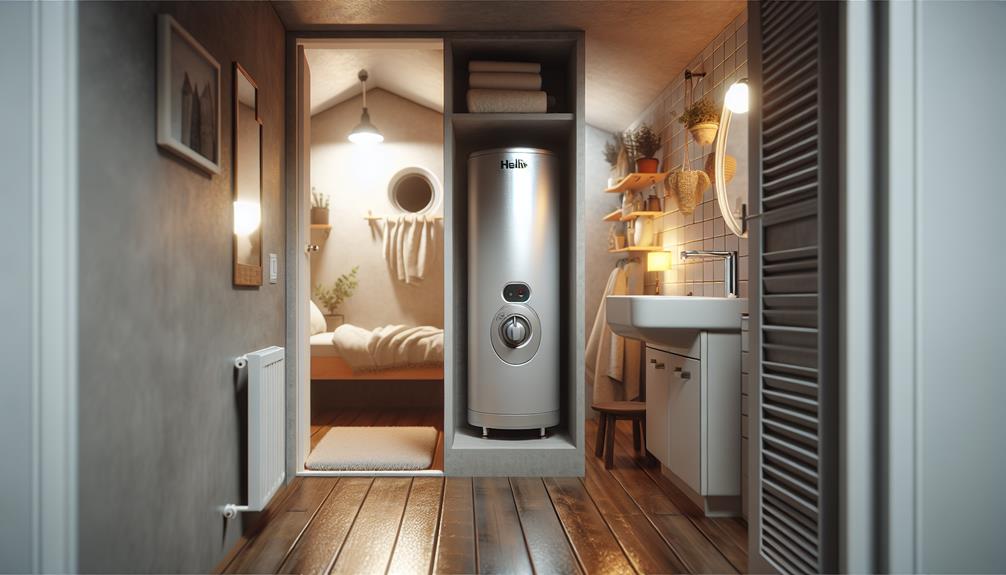Living in a tiny house is like navigating uncharted waters, and finding the perfect water heater is like discovering a hidden treasure.
As I set out on this quest, I never imagined the multitude of options and considerations that awaited me. From tankless to traditional, indoor to outdoor installations, and the various energy sources available, the world of tiny house water heaters is a vast ocean of possibilities.
In this discussion, I will guide you through the process of selecting the ideal water heater for your tiny haven, revealing the key factors to consider and the best options to explore.
So, let's embark on this journey together, uncovering the secrets to finding the perfect tiny house water heater that will provide you with hot water, no matter the size of your abode or the adventures that lie ahead.
Key Takeaways
- Tankless water heaters, such as the Rinnai V53DeP and the Ecotemp L5, are the best options for tiny houses due to their efficiency and compact size.
- Propane and natural gas are recommended as energy sources for off-grid living, while electric models are convenient for grid-connected homes.
- Outdoor installations of water heaters are preferred as they eliminate the need for complex venting and save indoor space.
- Gas options, such as propane or natural gas, provide reliable hot water without relying on external power sources and are more sustainable for off-grid living than traditional alternatives.
Top Tiny House Water Heater Options
When it comes to choosing the best water heater for a tiny house, there are several top options available that offer efficiency, compact size, and suitability for different living situations.
One cost-effective option is the Rinnai V53DeP, which has a flow rate of 5.3 GPM and can be powered by propane or natural gas. It offers the best power and build quality, making it suitable for both general and off-grid water heating.
Another option is the Precision Temp RV-550, with a flow rate of 1.5 GPM and powered by propane. It's a good choice for 12 volt systems and is best suited for RVs.
For outdoor showers and weekend cabins, the Ecotemp L5 is a great option. It has a flow rate of 1.5 GPM and is powered by propane, making it perfect for seasonal outdoor showers.
If you're on a budget, the Ecotemp L10 offers good features at a lower price. It has a flow rate of 2.9 GPM and is also powered by propane.
Finally, the Rheem RTEX-11 is super compact and best suited for those living on the grid. It has a flow rate of 2.68 GPM and is powered by propane.
These water heaters provide cost-effective options for tiny house living, ensuring efficient and reliable hot water.
Tankless Vs. Traditional Water Heaters
Tankless water heaters are the preferred choice over traditional water heaters due to their efficiency and compact size. When comparing the efficiency of tankless and traditional water heaters, there's a clear advantage in favor of tankless models. Traditional water heaters constantly heat water, even when not in use, leading to wasted energy.
In contrast, tankless water heaters only heat water when it's needed, resulting in significant energy savings. Additionally, tankless water heaters are compact and require less space compared to traditional models. This is especially beneficial for tiny houses with limited space requirements.
Indoor Vs. Outdoor Installations

To determine the best installation option for your tiny house water heater, it's important to consider the advantages and requirements of indoor and outdoor installations.
Indoor installations require vent tubes and cutting large holes in the wall, while outdoor installations eliminate the need for venting through a wall. Outdoor installations are quick and easy, with built-in vents in some units, while indoor units have specific venting requirements and limitations.
Outdoor installations save indoor space and simplify the venting process. However, indoor installations may be suitable for cold climates or well-insulated enclosures.
Factors to consider when choosing between indoor and outdoor installations include space availability, climate, and personal preference. Ultimately, a careful evaluation of the pros and cons of each option will help you make an informed decision for your tiny house water heater.
Energy Source Comparison: Propane, Natural Gas, Electric
For optimal efficiency and convenience, it's important to consider the energy source when choosing a tiny house water heater. The options typically include propane, natural gas, or electric.
- Propane vs. Electric Efficiency:
- Propane heaters are known for their high energy efficiency, providing fast and consistent hot water.
- Electric heaters are also efficient, but may take longer to heat water and may require a larger electrical supply.
- Pros and Cons of Natural Gas:
- Natural gas is a clean and efficient energy source, offering a cost-effective solution for stationary tiny houses.
- However, natural gas may not be readily available in all areas, limiting its suitability for mobile tiny houses.
When deciding on the energy source for your tiny house water heater, consider factors such as efficiency, availability, and the specific needs of your living situation.
Considerations for Off-Grid Hot Water Heating

Considering the energy source for your tiny house water heater is crucial.
Now it's time to explore the specific considerations for off-grid hot water heating.
When it comes to off-grid living, frost prevention and PEX line insulation are important factors to consider.
Frost prevention mechanisms are essential for outdoor-mounted hot water heaters, as freezing temperatures can damage the unit.
It's recommended to minimize PEX lines outside heated spaces and insulate them to prevent frost.
Proper insulation and the use of heating strip tape can also prevent pipes from freezing.
It's important to follow local advice and wisdom to prevent freezing in cold climates.
Frequently Asked Questions
What Are the Advantages of a Tankless Water Heater Over a Traditional Water Heater for a Tiny House?
The advantages of a tankless water heater over a traditional one for a tiny house include increased efficiency, compact size, and the ability to choose between propane, natural gas, or electric as an energy source.
Are There Any Specific Venting Requirements for Indoor Installations of Water Heaters in Tiny Houses?
There are specific venting requirements for indoor water heater installations in tiny houses. Vent tubes and large holes in the wall are needed. Outdoor installations eliminate the need for venting through a wall.
What Are the Benefits of Using Propane or Natural Gas as an Energy Source for Off-Grid Hot Water Heating in a Tiny House?
Using propane or natural gas for off-grid hot water heating in a tiny house offers benefits like reliability, sustainability, and independence. These energy sources provide consistent hot water without relying on external power sources, making them ideal choices for off-grid living.
Are There Any Alternatives to Using Propane or Natural Gas for Off-Grid Hot Water Heating in a Tiny House?
There are alternatives to using propane or natural gas for off-grid hot water heating in a tiny house. Solar powered alternatives and electric heat pump options offer sustainable and efficient solutions for heating water.
How Can Freezing of Pipes Be Prevented in a Tiny House With an Outdoor-Mounted Water Heater in Cold Climates?
Preventing freezing in outdoor water heaters is crucial in cold climates. Insulate PEX lines outside heated spaces and use heating strip tape for additional protection. Follow local advice and consider proper insulation to avoid pipes freezing in tiny houses.
Conclusion
In conclusion, after exploring the world of tiny house water heaters, we've discovered the perfect solution for your hot water needs. Whether you choose a tankless or traditional model, indoor or outdoor installation, or propane, natural gas, or electric energy source, there's a water heater that will meet your specific requirements.
So, don't compromise on efficiency or convenience in your tiny house. Choose the perfect water heater and embark on your hot water adventures with ease and satisfaction.

